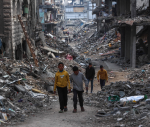You are here
Awaiting the ‘Deal of the Century’
Jan 21,2020 - Last updated at Jan 21,2020
President Donald Trump is weighing whether to publish his so-called “Deal of the Century” before the Israeli elections on March 2, according to a report from Axios by Barak Ravid.
The plan, already about three years old, has been postponed several times. Many, including this writer, predicted it has no chance of success, and although it’s final details are not know, the Palestinians have already rejected it. Even the Arab states, which the Trump peace team expected would support and even finance it, have maintained a cautious stance.
Last summer, peace project manager Jared Kushner convened a conference in Bahrain to reveal the economic part of the plan, in the hope of tempting the reluctant parties to reconsider. The effort barely left an impact. Not many took the promise and the lavish figures included in the economic vision seriously. Probably the Bahrain document made the presumed financiers even more apprehensive.
The repeated postponements of the plan were rightly interpreted as signs of hesitation from its creators themselves as they realised the mounting difficulties ahead. There were concerns on the part of the US peace team that even Israel would decline any clauses that might offer something to the Palestinians no matter how meager.
The question then is what is left to be revealed?
Not many question that the plan was manufactured in Israel. It was tailored to meet long-contemplated Israeli territorial ambitions to controlling most of the Arab territories occupied in June 1967.
So far, much of that has been granted even if just on paper. Trump already recognised Jerusalem as the capital of Israel. He also recognised Israel's annexation of the Syrian Golan Heights. And most recently, Washington has declared the Israeli colonies built on occupied Palestinians lands legal.
Although all the decisions are flagrant violations of international law and of UN resolutions approved by the US itself, they still encourage additional Israeli unilateral measures and violations, particularly the acceleration of colonisation of Palestinian land.
Israel has been very happy with what has been achieved so far. But from its perspective, the steps taken are by no means adequate. Israel hopes that during the Trump administration, the Palestinian issue will be completely liquidated by turning the current status quo into a final settlement.
Israel wants the Palestinians to relinquish once and for all any talk about the right of return, hence the US attempts to terminate the mandate of UNRWA, the UN agency for Palestine refugees, and to permanently settle the refugees where they currently are.
Territorially, Israel wants to annex the West Bank settlements with additional expansions including the Jordan Valley and "Area C", some 60 per cent of the occupied West Bank.
This may happen if Netanyahu wins the upcoming March elections as it is undoubtedly part of the "peace" plan.
In return, the Palestinians would be granted administrative rule in the little land left, and possibly an insecure link with Gaza.
The most the Palestinian can hope for would be that they are allowed to survive in the West Bank and Gaza as long as they behave. The entire Palestinian area, with whatever internal security and repression apparatus it may be permitted to have, would remain under full Israeli control, much as the situation in the West Bank now.
Right from the beginning, I predicted no future for the plan and that is still the assessment. On top of the Palestinian rejection, there are rejections form Arabs and others, even if not clearly declared.
The UN already rejected all unilateral US decisions regarding Jerusalem, the Golan Heights, settlements and UNRWA. Any similar decisions will also be rejected.
What purpose does the plan have, therefore? The only goal of publishing would be to help Netanyahu win the election, and then proceed with annexation.













